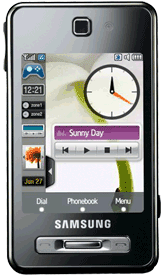 When I reviewed Samsung’s touch screen feature phone, the Tocco SGH-F480, I described the home screen widgets, part of the company’s “TouchWhiz” user interface, as “a fun but under developed feature”. At the time, the Tocco only offered seven widgets, including a clock, calendar, birthday reminder, photo browser and music player, and I bemoaned the fact that third-party developers were unable to create more.
When I reviewed Samsung’s touch screen feature phone, the Tocco SGH-F480, I described the home screen widgets, part of the company’s “TouchWhiz” user interface, as “a fun but under developed feature”. At the time, the Tocco only offered seven widgets, including a clock, calendar, birthday reminder, photo browser and music player, and I bemoaned the fact that third-party developers were unable to create more.
That was almost a year ago, and today Samsung announced that it’s finally opening up the TouchWhiz widget platform, which exists across many of the company’s touch screen phones running Symbian, Windows Mobile, and the handset maker’s proprietary operating system. Third party developers will be able to build their own home screen widgets using familiar web standards – HTML, JavaScript and CSS – similar to Nokia’s WRT or, on a more ambitious scale, the Palm Pre’s WebOS, or indeed any widget platform whether it be targeting mobile, the PC or the television.
See also: Survey: Consumers warm to Internet widgets on the TV
Indeed, widgets built using common web standards are fast becoming the lowest common denominator for application development across all three screens, something that Samsung is keen to highlight in a bid to attract developers to its TouchWhiz platform.
Unlike complex native languages widget development utilises the comparably simple web authoring technologies HTML, JavaScript and CSS. Once developed they can be run on any Samsung device running the TouchWiz UI, and indeed, with some minor adjustments any platform or device featuring a web run-time engine. This could be a mobile device from another manufacturer, a PC or even an appliance such as a Samsung Series-7 television.
Samsung says that developers will have the choice of whether to charge for their TouchWhiz widgets or offer them for free, although all offerings will need to be certified by the company first.
